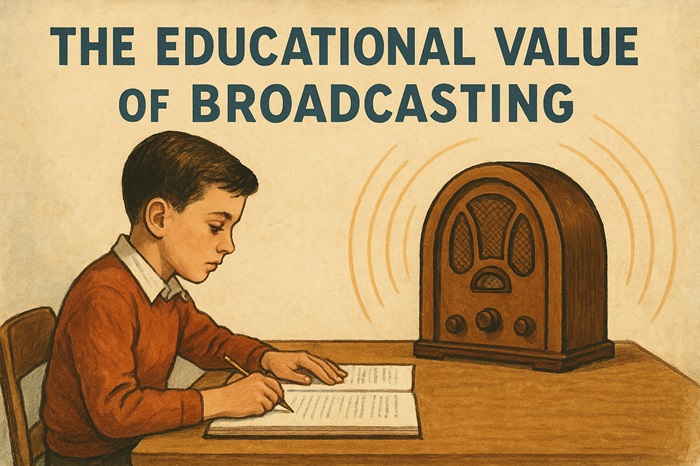In the Western countries, the radio is considered to be one of the most powerful instruments of education. In Pakistan a majority of listeners
in for it to listen the recorded music. The average Pakistani feels bored
by literary and scientific talks; his great interest being the lighter items on way as he reg. ‘ds his gramophone.
the progran me. This fondness for music, etc., is due to Pakistani
listener’s pec liar way of thinking. He regards the radio much in the same
In fact, we have a cultural lag in our country in the sense that our
people have ery limited recreation or amusement at their disposal with
the result that they would always listen to radio to amuse themselves.
quite imperative that our people should recognise the
educational value of broadcasting. The radio is a delightful home-teacher
if only one listens to it patiently and regularly. When we analyse the daily
programme of a foreign broadcasting station, we find that there are
innumerable useful talks on literary, political, social and economic
subjects sides the daily dose of music and laughter. Eminent authors,
politicians and specialists are invited to give interesting talks on topics of
general interests. Sometimes we hear a doctor telling us how to protect
ourselves against malaria or smallpox; there is a short-story writer or a
prominent poet, or a novelist speaking upon the different features of his
craft; again there is a political leader speaking upon the agrarian reforms.
The great advantage of the radio is that there is no school-room
atmosphere about it. The speaker has to be careful to make his talk
interesting and intelligible. He very well knows that if he is dull, he has no
chance on the radio. The radio authorities enlist the best available talent in
framing their programmes. Literature, science, medicine, politics, films
alike form the subject-matter.
In some American universities which have twenty or twenty-five
students or rolls of their colleges, lectures are being delivered to the
students through the radio. May be, in future, the learned professors will
be invited to broadcast their lectures from South-western, Columbia,
Oxford, Cambridge and other universities and their classes would consist
of students of the entire English-speaking world. Following are the
advantages of radio service.
ADVANTAGES OF RADIO SERVICE.
1. Immediacy: Radio enables us to know important events which
.otherwise we would have to experience second-hand. Especially in a
country like Pakistan, where means of communication in the villages are
very limited, this will serve a great cause.
2. Reality: A spectator who tells a radio listener what he sees, as
he sees it, may be more impressive than a newspaper reporter dealing with
an identical matter. There are two differences: the broadcaster is on the
scene and the tones of his voice communicate shades of meaning that the
newspaper story, hours, days, or even months after the event, cannot
convey. We may not hear only the speaker’s voice but the background
the jungle cries on a hunting trip in Africa, a football game in America,
the coronation of Queen Elizabeth II. It is now possible to broadcast from
any part of the world.
3. Emotional impact: Radio brings dramatic feelings to the
listeners. It has the warmth of a drama, the personal feelings of the
presence of actors. It can certainly carry to the listeners all the emotional
overtones of the broadcast itself.
4. Group values: It meets the problem of the dearth of teachers for
a broadcast can be understood by hundreds of listeners.
5. Inexpensiveness: Used as a mass media, the cost per capita of
radio-listening is very small.
This does not mean that the use of broadcast obviates the need for
teachers. On the other hand, it is a good agency which will help the
teachers, and learning will become easier.
